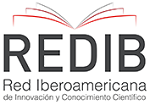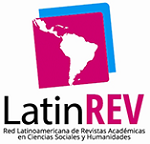Respuesta magnética de un superconductor inmerso en un campo de calor.
DOI:
https://doi.org/10.15649/2346030X.674Palabras clave:
ginzburg-landau, gradiente de temperatura, magnetización, superconductividadResumen
En este trabajo aplicamos la teoría Ginzburg-Landau dependiente del tiempo (TDGL) para calcular la magnetización M(H), la configuración de vórtices y la densidad de corriente de muestras mesoscópicas en materiales superconductores sometidos a diferentes gradientes lineales de temperatura. Resolvemos las TDGL en una película delgada cuadrada, inmersa en un campo magnético externo homogéneo H(t) aplicado perpendicularmente a su superficie. Observamos que los vórtices ingresan a menores campos magnéticos cuando la temperatura de la muestra es mayor. A su vez el ingreso de lo vórtices siempre ocurre por la superficie a mayor temperatura.
Referencias
M. Thinkham, “Introduction to Superconductivity”, 2nd ed. (McGraw-Hill, New York, 1996).
E. D. Valbuena, A. Diaz Lantanda, J. Barba-Ortega, Vortex “Matter in a Superconducting Square Under 2D Thermal Gradient”, J. Low Temp Phys 195, 202 2019.
L. Komendova, M.V. Miloševic, A.A. Shanenko y F.M. Peeters, “Different length scales for order parameters in two-gap superconductors: Extended Ginzburg-Landau theory”, Phys. Rev.B, 84, (2011) 064522.
R. Fazio, V.F. Gantmakher y Y. Imry “New Directions in Mesoscopic Physics”, edited by (SpringerVerlag, Berlin) 2003.
J. Barba-Ortega y M.R. Joya; “Superconductividad mesoscópica”; Revista Cientifica UPB, 5, (2011) 2.
Mesoscopic superconductivty in application. J. Barba-Ortega, J Bautista-Ruiz y E. Sardella, “Journal of Physics: Conference”, Series 1126 (1), (2018) 01, 2003.
J. Barba-Ortega, E. Sardella, J. Albino-Aguiar, “Superconducting boundary conditions for mesoscopic circular samples, Supercond”, Sci. Technol. 24, 015001, 2011.
C. Aguirre, M.R. Joya, J. Barba-Ortega, “Effect of anti-dots on the magnetic susceptibility in a superconducting long prisma”, J. Low Temp. Phys. 186, 250, 2017.
P.G. de Gennes, J. Matricon, “Collective modes of vortex lines in superconductors of the second kind”, Rev. Mod. Phys. 36, 45, 1964.
L. Komendová, A. Yajiang-Chen, A. Shanenko, M.V. Milošević y F.M. Peeter, “Two-band superconductors: Hidden criticality deep in the superconducting state”, Phys. Rev. Lett 108, 207002, 2012.
N.V. Orlova, A.A. Shanenko, M.V. Miloševic, F.M. Peeters, A.V. Vagov, V.M. Axt, y Ginzburg-Landau “theory for multiband superconductors: microscopic derivation”, Phys. Rev. B 87, 134510, 2013.
C.A. Aguirre, Q. Martins y J. Barba-Ortega, “Analytical development of Ginzburg-Landau equations for superconducting thin film in presence of currents”, Rev. UIS Ing. 18 (2), 213, 2019.
Q. Du, “Numerical approximations of the Ginzburg-Landau models for superconductivity”, J. Math. Phys. 46, 095109, 2005.
C.A. Aguirre, M.R. Joya y J. Barba-Ortega, “Dimer structure as topological pinning center in a superconducting sample”, Rev. UIS Ing. 19 (1), 109, 2020.
W.D. Gropp, H.G. Kaper, G.K. Leaf, D. M. Levine, M. Palumbo y V.M. “Vinokur, Numerical simulation of vortex dynamics in type-II superconductors”, J. Comput. Phys. Vol. 123 (1996) 254.
G.C. Buscaglia, C. Bolech y A. Lopez, “Connectivity and Superconductivity”, ed. J. Berger and J. Rubinstein (Heidelberg: Springer); New York, 2000.
J. Berger, “Time-dependent Ginzburg-Landau equations with charged boundaries”, J. Comput. Phys. 46, 095106, 2005.
M.V. Milosevic y R. Geurts, “The Ginzburg-Landau theory in applications”, Physica C. 470, 791, 2010.
Nanoscience y Engineering “in Superconductivity, eds V. V. Moshchalkov, R. Woerdenweber and W. Lang, Springer”, New York, 2010.
Handbook of Superconductivity, “eds. Charles Poole Jr., Academic Press”, New York, 2000.
Q. Du, M.D. Gunzburguer, J.S. Petersons, “Solving the Ginzburg Landau equations by finite element methods, Phys. Rev. B, 46 14 (1992) 9027.
Q. Du, M.D. Gunzburguer y J.S. Petersons, “Analysis and approximation of the Ginzburg Landau model for superconductivity”, Phys. Rev. B, 4 1 (1992) 54.
L. Peng , J. Lin, Y. Zhou, Y. Zhang, “Vortex States in Nanosized Superconducting Strips with Weak Links Under an External Magnetic Field,” J. Sup. Novel. Magn, 28 (2015) 3507.
P. Kuopanportti, N.V. Orlova y M.V. Milosevic, “Ground-state multiquantu vortices in rotating two-species superfluids”, Phys. Rev. A. 91 (2015) 043605.
D.S. Dantas, A.R.P. Lima, A. Chaves, C.A.S. Almeida, G.A. Farias, M.V. Milosevic, “Bound vortex states and exotic lattices in multicomponent Bose-Einstein condensates: The role of vortex-vortex interaction”, Phys. Rev. A, 91, 023630, 2015.
Descargas
Publicado
Cómo citar
Descargas
Número
Sección
Licencia
La revista ofrece acceso abierto bajo una Licencia Creative Commons Attibution License

Esta obra está bajo una licencia Creative Commons Attribution (CC BY 4.0).










